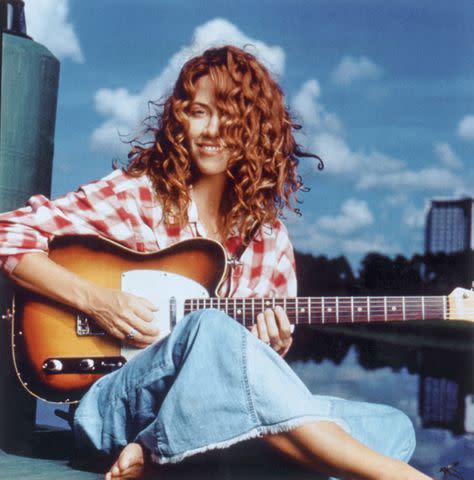Sheryl Crow Says 'Having to Defend' Herself from 'Very Sexist' Men Inspired Her Hit 'If It Makes You Happy' (Exclusive)
- Oops!Something went wrong.Please try again later.
The soon-to-be Rock & Roll Hall of Famer shares the stories behind some of her biggest classics with PEOPLE in this week's issue

Gilbert Flores/Variety via Getty
Sheryl Crow performing at the 2023 iHeartRadio Music Festival in Las Vegas.Sheryl Crow may be a mom of two, but her brood is actually a bit bigger. That is, if you count the many songs in her prolific song catalogue.
“Songs are like your children—like, ‘Yeah, that kid’s 30 years old now and I guess he’s doing OK,’” the singer-songwriter, 61, tells PEOPLE in this week’s issue.
With 11 studio albums to her name and more than 50 million records sold, Crow brought plenty of music into the world, and will be recognized for her contributions on Nov. 3, when she’s inducted into the Rock & Roll Hall of Fame at a ceremony in New York City.
Following the success of her 1993 debut album Tuesday Night Music Club, Crow’s star continued to shine, and she found hits with songs like “Soak Up the Sun,” “If It Makes You Happy” and “The First Cut Is the Deepest.”

ANL/Mail On Sunday/Shutterstock
Sheryl Crow in 1996.Her last album, Threads, came out in 2019—and though she said at the time it would be her last, Crow reveals that she has a new album ready for release that hasn’t yet been officially announced.
“I said I was never putting out another album, but there are several songs on that that I feel like are, to me, the best songs I’ve ever written,” she says. “I’m excited! You can never be too old to be excited. You can watch lines grow on your face and you can watch some of your abs start to really disappear, but you’re never too old to get excited.”
Here, Crow shares insight and inspiration behind some of her biggest hits.
"If It Makes You Happy"
Though Crow's debut album was a hit, its success put her in a difficult place. Because she'd written Tuesday Night Music Club with a group of male musicians — many of whom share songwriting credits on the record — the singer found herself hit with a barrage of criticism that claimed her success hadn't been earned.
“There was a lot of speculation, mostly male writers, saying, ‘She didn’t write her own record. There were a bunch of guys in the room,’” she explains. “It was a very sexist moment in the history of music.”
When it came time to record her second album (1996's Sheryl Crow) she called on collaborator Jeff Trott, who came ready with the song's famous chorus: "If it makes you happy, then why the hell are you so sad?"
“It was a message to everybody that had been a part of the first record—while everybody’s making a ton of money off this record, I’m the one that’s having to defend myself. That was basically the impetus for the song,” she says. “But it also through the years has redefined itself as, quit complaining everybody. Look at the joy in your life.”
"All I Wanna Do"
Crow had every intention of rewriting the lyrics to her breakthrough hit, which peaked at No. 2 on the Billboard charts upon its release in 1993. She'd been struck by inspiration after reading Wyn Cooper's poem "Fun," which begins with the opening line, " 'All I want is to have a little fun before I die,' says the man next to me."
But despite her best efforts, she couldn't get it quite right, and eventually called Cooper to ask his permission.
“Sometimes you can’t mess with inspiration. I wrote five different lyrics for it, and nothing ever felt the same as Wyn’s poem,” she says. “So we called him and said, ‘Look, we’ve written this song, probably nothing’s going to happen, but we’re going to give you half the song.’ And lo and behold, it was one of the biggest hits I ever had.”
Crow says she initially didn't think much of the track, and credits her brother Steven with rescuing it and bringing it into the light.
“We had a running joke in my family that my little brother was my A&R guy because, honest to goodness, that song felt to me like a throwaway or a B-side,” she says. “And he’s like, ‘No, that song is the song that me and my friends love the most, and that’s your hit.’ He was right.”
"Make It Go Away (Radiation Song)"
This track, which appears on Crow's 2008 album Detours, was born amid a difficult period of life: in the very same week in 2006, the was diagnosed with breast cancer, and her relationship with cyclist Lance Armstrong fell apart.
“I made an oath that I wouldn’t bury the experience—I’d sit with it and really work my way through it,” she says. “I hold myself up to the standard of being a really good person, so to find myself lying on a radiation table facing my mortality, there are a lot of questions that go along with that: What did I do wrong? Why do I deserve this?”
Crow says that writing "Make It Go Away" felt to her "like a moment of closing the book on that chapter."
“It was sort of like, ‘OK, I’ve crossed the finish line, I’ve come out on the other side.' It felt great and empowering," says the star, who is in remission and has worked to raise awareness about the importance of early detection.
Related: Sheryl Crow Not Sure If Her 2 Sons Want to Follow in Her Footsteps: 'But They're Both Musical'
"Leaving Las Vegas"
Though this hit, off her 1993 debut, was written years before Crow adopted sons Wyatt, 16, and Levi, 13, it now reminds her of them.
“When my 13-year-old was little, he always thought the first line ‘Life springs a turtle’ instead of ‘Life springs eternal,’” she explains. “Kids bring levity to how seriously you take yourself.”
For Crow, some of her favorite memories are from when her sons were young, and often wanted to have dance parties to songs like "Real Gone" and "Soak Up the Sun."
“Still when I play those songs, I think of them: one in their pajamas, one in a diaper,” she says. [Motherhood] changes the way you look at everything. It put everything into perspective.”

Paul Hiffmeyer/Disneyland Resort via Getty
Sheryl Crow with sons Wyatt and Levi in 2012.The musician also says that parenthood has inspired her in unexpected ways as a songwriter, as she feels a more urgent sense of "immediacy" than she did before.
"I wouldn’t have written so many songs had it not been that I feel like I’m fighting," she says. "I’m on the front lines of an army that’s fighting for the future of our children.”
"My Favorite Mistake"
The mid-tempo hit, off Crow's 1998 album The Globe Sessions, tells the age-old story of a lover who doesn't quite treat her right, but despite all his flaws, she can't bring herself to hate him the way she should.
Crow has long kept coy about just who inspired the song, and likens it to Carly Simon's 1972 classic "You're So Vain," an ode to a narcissistic lover whom Simon has vowed never to reveal.
“It’s still so personal to me that I don’t know that anybody knows who it’s really about. I guess it’s my ‘You’re So Vain’ moment—I Carly-ed it,” she says.
Though the star knows that many fans assume "My Favorite Mistake" is about rocker Eric Clapton, she explains that's not the case, as the song actually pre-dates their relationship in the late 1990s.
“I love Eric, and I admire him, but the song was older than that. I’d been engaged, and I was out of my engagement,” she says. “I uprooted myself [from L.A.] and moved [to New York City] and was really, really raw from a relationship I had had that was just simply a very bad idea. A lot of that record was weeding through the upheaval, digging through the subterfuge.”
Related: Sheryl Crow Is 'Still in Shock' After Rock and Roll Hall of Fame Nomination
"Soak Up the Sun"
This breezy 2002 hit, another collaboration with Trott, was "really based on the state of everything at the moment," says Crow, explaining that she was struck by the jarring juxtaposition of the rich and famous's devotion to decadence just as climate change and global warming were starting to rear their ugly heads.
“We already knew what was happening in the environment, and yet everything that you saw on MTV was like, bling and Rolls Royces and girls, and it just was such a weird dichotomy to be like, ‘The planet’s dying, yet we’re really going to concentrate on how much wealth we can accrue,’” she says. “That’s what inspired the song: looking over at MTV like, ‘Whoa, what is happening here?’”
"Love Is a Good Thing"
For her second album in 1996, Crow included this song, a commentary on gun control and how easy it is for young people to go into stores and purchase a weapon.
The song mentions Walmart by name in a lyric that suggested the store (which was and still is the nation's largest retailer) sells guns to children — and in response, Walmart banned the sale of Sheryl Crow on its shelves, according to the Los Angeles Times.
“I think ‘Love Is a Good Thing’ was monumental for me because there was a choice there of changing the name of the discount center and not being taken out of the only store that my record was carried in in most of the small towns in America,” she says. “By that time, mom-and-pop record stores were out of business, and really the only place you could buy a record was Walmart or Target. And there was a moment where I sort of had to say, ‘OK, am I willing to forego at least half of my sales and stick to my guns?’”
She continues: “I think historically for me, I write about what is on the surface of my brain and I don’t think about the repercussions until I have to deal with them. Otherwise, I probably wouldn’t write the songs that I’ve written.”
"Real Gone"
Crow wasn't exactly sold when she was approached by Disney/Pixar to record a song for the soundtrack to the 2006 movie Cars.
“They sent me some clips of these talking cars with Owen [Wilson] and Bonnie Hunt and I was just like, ‘Yeah, I don’t really get it. Is this really going to be a big movie?’” she recalls.
Eventually, though, she and cowriter John Shanks got to work, and "Real Gone" was born.
"We wrote a song, and then it became huge," she says. "It's the gift that keeps on giving."
"Everyday Is a Winding Road"
Crow initially wrote this 1996 song about a friend who died by suicide, and says its initial meaning was to capture "that feeling of, 'I don't even know who I am in my life anymore.'"
But during the pandemic, she started doing online corporate gigs to pay her crew — and found that the song's meaning had shifted.
“It seemed to resonate with people and with me during that time, because I think we were all forced to meet ourselves in that moment,” she says. “That was the last song of every gig I did, and it was kind of a blessing. Those are always the best songs, the ones that grow with you and make you scratch your head and go, ‘Oh wow, I didn’t get that when I first wrote it.’ It kind of turns around and teaches you.”
For more on Sheryl Crow, pick up the latest issue of PEOPLE, on newsstands everywhere Friday.
For more People news, make sure to sign up for our newsletter!
Read the original article on People.

